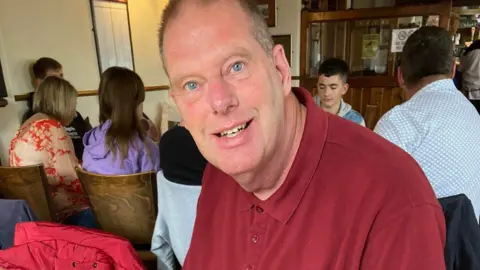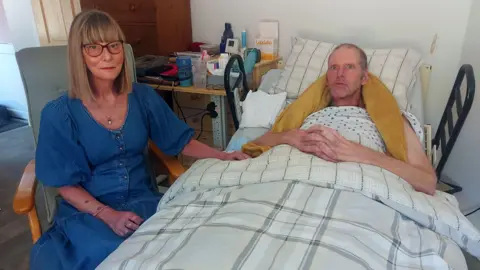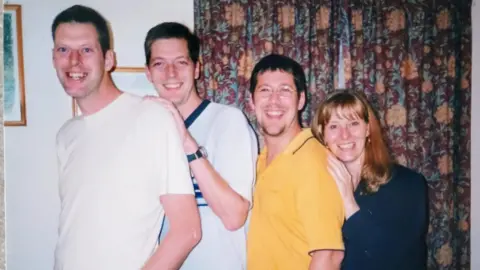I've stopped life-saving medication says man exhausted by fight for NHS care

Tim Hull can point to many achievements during his 56 years. He's run his own handyman business and housed Ukrainian refugees for two years. He's even been in the Guinness Book of Records: at nearly 7ft in height, he and his brother were the UK's tallest twins for almost two decades.
But it is a life Tim has decided to end. His quality of life, he says, is "very, very low". Tim has a medical condition - unrelated to his height - that weakens his muscles, and his health has declined rapidly over the past two years.
It is the battles to get the health and care support he needs which have driven him to make the desperate decision, says Tim. He feels abandoned by health professionals, has been moved from one waiting list to another, has not been provided with the right equipment to help him and has been bed-bound for nearly seven months.
In February, he stopped taking the medication that prevents his kidneys from failing. They are now beginning to give up and he knows he has months, if not weeks, to live.
"I don't feel that things are going to get any better than this," he tells BBC News. "I just feel [ending my life] would be a better option than lying in bed 24 hours a day."
Tim's neurological condition is rare, however, many of the difficulties he has faced feel familiar to many.
Over the past two years, BBC News has been contacted by the families of more than 250 people with serious disabilities or illnesses about their struggles to access health and care services.
Many described the impact of very long waits for assessments, appointments, and for vital equipment that can help them cope at home.
They also highlighted the frustrations of trying to get someone to signpost the right services, being passed from department to department, and the feeling that they were only listened to when they reached a crisis.
For some there were also lengthy arguments over whether their care should be paid for by the NHS or local councils.
Tim, who lives on his own in Worcester, first went to his GP in 2022 because he started stumbling while walking.
He was referred to a rheumatologist. He waited a year for the appointment only to be told it was the wrong specialism.
He then waited several months to see a local neurologist, then several more months to see a more senior neurologist in Birmingham. In the two years this took, he lost the ability to walk and had to use a wheelchair.
Tim was eventually diagnosed with a rare neurological condition, Hereditary Spastic Paraplegia (HSP), which causes spasms and muscle weakness. Pain, fatigue and depression are also common symptoms.
It is incurable, but according to the NHS website, it does not usually affect life expectancy. There are more than 80 variants, but Tim says he has yet to be told which he has. Physiotherapy and drugs are generally used to manage the symptoms, but Tim felt after being diagnosed he was just expected to "get on with it".
In 2024, he spent two months in hospital. While there, regular physio helped him regain some mobility, but after he was discharged there was no ongoing support. His case was referred back to Worcester and its neurology therapy team.
Tim received a letter dated 10 July 2024 welcoming him and saying he was on the waiting list for an assessment. Despite chasing for an appointment, he says he heard nothing. A year later, on 15 July 2025, he got another almost identical letter. It says welcome, you are on a waiting list. This time it included an information leaflet.

When Tim has asked his GP for help, he says he has often been told his case is too specialist and he should call 111.
Tim's height has added to his difficulties. Getting the basics right for someone who is 6ft 10in (2.08m) has seemingly been impossible.
He used all his savings to adapt his home and buy equipment so he could live downstairs, but spent two years in a standard hospital bed, provided by the NHS, which was too small for him. He describes it as "hideously uncomfortable" and like "torture". Three months ago, he was finally given a new, longer bed, but that causes him to sit up in a position that he says led to a major choking incident one mealtime. He now mostly has meal-substitute drinks.
Finding a hoist to lift him in and out of bed has also been a major problem. The first two tried by the NHS were too small to be used safely.
At the end of April, there was discussion about putting in a ceiling hoist. Two-and-a-half months on they are still waiting. It means Tim has not been able to leave his bed since February this year.
He is also waiting to be fitted for a wheelchair that can cope with his height, but that cannot happen until there is a hoist to lift him out of bed.
"Life is just lying in a bed on a day-to-day basis, feeling very uncomfortable, fighting to get support," says Tim. "Above a certain height, you don't exist.
"I'd had enough of living the way I was. I couldn't see myself getting any better and decided I didn't want to be here anymore," he says. The health and care system, he adds, "hasn't worked. There's no joined-up thinking. Nobody cares."
Authorities responsible for Tim's care say they cannot comment on individual cases but that they regularly review how care is delivered to meet each person's "unique needs".
Herefordshire and Worcestershire Health and Care NHS Trust says that "where equipment, home adaptations or community nursing support are required, we aim to have these in place [before discharge] to ensure a safe, well supported transition from hospital to home".

Tim has a separate, hereditary kidney condition, called polycystic kidney disease. His twin Andy, their father Alan and sister Sue were also born with the condition.
Twenty years ago, Tim had a kidney transplant from his older brother, Richard. Tim's twice-daily tablets are supposed to stop the kidney from failing.
Without them Tim knows he has months, if not weeks, left to live. He feels he has little choice but to stop taking the tablets.
Sue, a retired children's social worker, says she is devastated by Tim's decision.
"He doesn't need to be lying here dying. He's got so much more to give," she says. "And I just feel that he's been completely abandoned."
She spends nearly every day caring for him and has made endless calls to try to get him the support he needs.
In February, Sue made urgent calls to Tim's GP, local mental health services and adult social services because he was so low. Again, she says she was passed from pillar to post, and that getting help was a fight. There was "no joined-up thinking", she says.
Six months after stopping the tablets, Tim says he does not regret it.
But pressed on what would make a difference, he says: "If I could be hoisted out [of bed] and sat up to have dinner, if I could be wheeled out into the garden just to get a change of scenery, that could help a lot."
A friend suggested Sue should contact the local hospice. It has now become the central point of advice, support and information that Tim desperately needed two years ago. It manages his pain medication and has helped him get NHS funding for four care visits a day. It also arranged for a psychologist to check he had capacity to make his end-of-life decision.
He says he's been asked that question by clinicians several times, but no-one has ever asked what can be done to make him rethink.
The tragic irony that it took the move to end-of-life care to get them more joined-up help is not lost on Sue, but she says it is still not enough to provide the level of support he really needs.
"I feel absolutely heartbroken by the situation," she says. "I think I've gone beyond anger. I just can't believe that the UK would allow this to happen.

Tim's local NHS Trust says "we work in close partnership with other health and care organisations to make sure patients experience joined‑up care. Multidisciplinary teams (MDTs) bring together professionals from different specialisms to regularly review each patient's needs".
NHS Herefordshire and Worcestershire Integrated Care Board (ICB) says it regularly reviews how care is delivered to "make sure it meets the needs of patients and is both safe and effective". It also says it has "clear systems in place to respond to any concerns, learn from incidents, and continuously improve care across the whole system".
The ICB says it aims to "ensure everyone feels seen, heard, and supported – no matter their individual circumstances".
The Department of Health and Social Care (DHSC) says "it is unacceptable that Mr Hull has not received the care he deserves" and that it is working to ensure everyone has access to high-quality care.
The DHSC says its 10-year health plan will "shift healthcare out of hospitals into the community, to ensure patients and their families receive personalised care in the right place, at the right time". It also says it is investing an additional £100m into hospices and end-of-life care.
Tim is now much frailer, and on very strong painkillers. He says in the time he has left he wants to be "as comfortable and supported as possible," adding that "there's a lot of fear of the unknown with the decisions I've made".
If you are suffering distress or despair, details of help and support in the UK are available at BBC Action Line.
BBC





